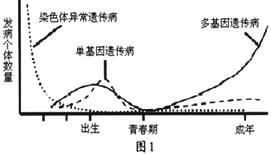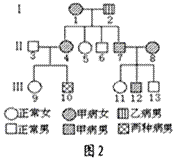问题
填空题 案例分析题
图1曲线表示各类遗传病在人体不同发育阶段的发病风险,图2是患甲病(显性基因为A,隐性基因为a)和乙病(显性基因为B,隐性基因为b)两种遗传病的系谱图,其中Ⅱ3不是乙病基因的携带者。


染色体异常遗传病风险在出生后明显低于胎儿期,这是因为()
答案
参考答案:常染色体显性;伴X隐性;17/24
图1曲线表示各类遗传病在人体不同发育阶段的发病风险,图2是患甲病(显性基因为A,隐性基因为a)和乙病(显性基因为B,隐性基因为b)两种遗传病的系谱图,其中Ⅱ3不是乙病基因的携带者。


染色体异常遗传病风险在出生后明显低于胎儿期,这是因为()
参考答案:常染色体显性;伴X隐性;17/24